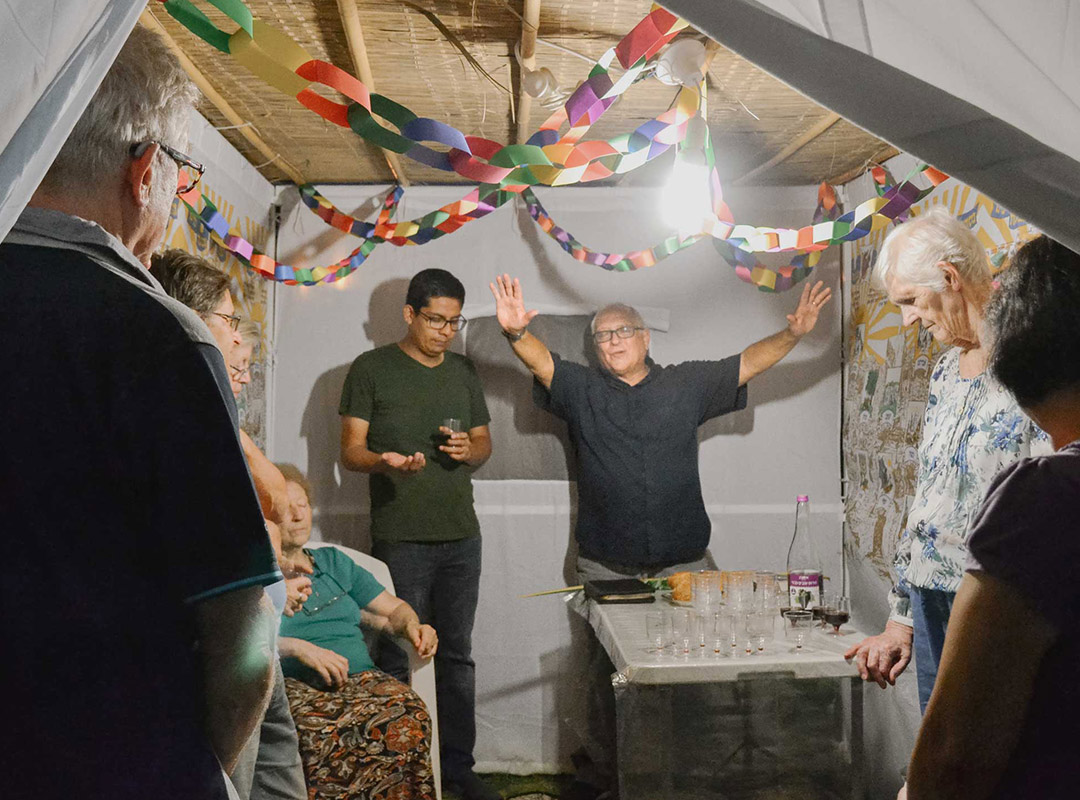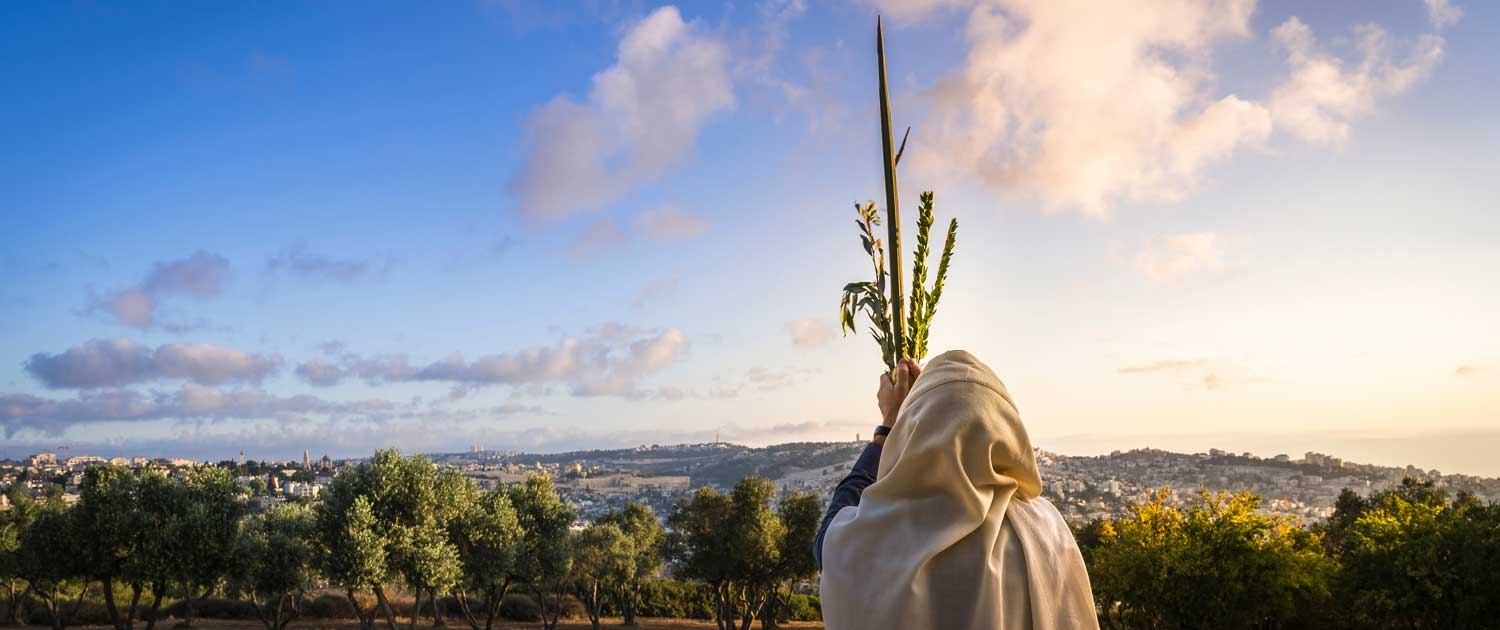Sukkot: God Desires to Dwell with His People

Jesus is the fulfillment of all the Jewish festivals, including the Feast of Tabernacles (Sukkot). He is the consummation of the holiday as He is God in the flesh who “tabernacled,” or lived, among us. As John wrote, “And the Word became flesh, and dwelt among us, and we saw His glory, glory as of the only begotten from the Father, full of grace and truth” (John 1:14).
This beautiful verse echoes the Tabernacle the Israelites built in the desert. Just as God dwelt with His people in the Tabernacle, God dwells in the flesh with His people through Jesus. Jesus is the true Tabernacle, God’s manifest glory and presence, foreshadowed by God’s glory and presence by which He led His people through the challenges of the wilderness.
Veiling His pure glory, God became human through the incarnation (Philippians 2:5–11); Jesus took up residence among the people of Israel for a short sojourn. He now sits at God’s right hand, where He intercedes for His followers. Soon, He will return to rule on earth from the new Jerusalem, when the King Messiah will pitch a far grander tent, encompassing Israel and the nations under His sovereign leadership.

Jesus the Messiah and the Feast of Tabernacles
When Jesus celebrated the Feast of Tabernacles, He made one of His greatest and most profound announcements about His identity as Messiah (John 7). On the seventh day of the feast, it was the custom of Jewish people during this period to send a group of Levities accompanied by musicians to the pool of Siloam to gather running water in giant vessels to bring to the altar.
They would march around the altar crying out, “Lord, save us! Lord, save us!” many times. Then, they would pour the water from the vessels at the base of the altar. This act symbolized the hope of the Jewish people looking toward the day when Messiah would come and pour His Spirit upon the people of Israel in fulfillment of Joel 2:28–29:
It will come about after this that I will pour out My Spirit on all mankind: and your sons and daughters will prophesy, your old men will dream dreams, your young men will see visions. Even on the male and female servants I will pour out My Spirit in those days.
According to Jewish tradition, these events in Joel were to take place when the Messiah appeared on earth. This pouring out of the water at the base of the altar in the Temple was a foretaste of the outpouring of God’s Spirit. The water-drawing ceremony, as it was known, was a portrait of the day when God would send His Messiah and His Spirit, causing the Jewish people to come alive spiritually as never before.
Jesus understood this tradition; therefore, on the seventh great day of the feast, He stood up and said:
“If anyone is thirsty, let him come to Me and drink. He who believes in Me, as the Scripture said, ‘From his innermost being will flow rivers of living water.’” But this He spoke of the Spirit, whom those who believed in Him were to receive; for the Spirit was not yet given, because Jesus was not yet glorified. (John 7:37b–39)
The Feast of Tabernacles is one of the three biblical festivals on which God required Jewish men to visit Jerusalem. As a result, crowds of Jewish people from around the world were present to hear Jesus make this statement. Jesus was telling the masses He was the Messiah, the Spirit of God was about to be poured out, and He was the living water to which He referred. Those who drink—who believe in Him—will never thirst again!
The Ultimate Meaning of the Feast of Tabernacles
We must also mention the ultimate and eternal significance of the Feast of Tabernacles—God dwelling among humankind for all eternity. As the apostle John wrote,
And I heard a loud voice from the throne, saying, “Behold, the tabernacle of God is among men, and He will dwell among them, and they shall be His people, and God Himself will be among them, and He will wipe away every tear from their eyes; and there will no longer be any death; there will no longer be any mourning, or crying, or pain; the first things have passed away.” (Revelation 21:3–4)
God will fulfill the kingdom promises to Jewish people and establish the throne of Jesus in a literal but renewed Jerusalem. But this is not the end of the story—there is more to come. Ultimately, the whole earth will become the tabernacle of God as He reigns through His Son for all eternity. What greater joy can there be than to be in the presence of God forever?
The Feast of Tabernacles
and
the Next Generation
Israel’s fall festivals contain layers of biblical understanding imperative for the next generation to embrace and make their own. As Deuteronomy 6:7 implores, “You shall teach [God’s Word] diligently to your sons.” Within the Jewish community, the annual observance of these festivals helps solidify these biblical truths deeper and deeper into our children as they experience them each year.
Here are some real examples of how families in Messianic Jewish congregations celebrate the fall festivals with their children in a Jesus-glorifying way:
- Celebrating Sukkot From an early age, our kids loved celebrating Sukkot (the Feast of Tabernacles)! We would gather every year with friends and congregation members to build and decorate the sukkah, share a big meal together, and sing loudly into the night. The kids latched onto the fun and excitement associated with the holiday, and we would use it as a way to teach about God’s presence with us as well as the glory of His coming kingdom.
- Connections between Jewish holidays and MessiahWhen the kids were younger, my wife would use the holidays to show the powerful connections between each Jewish holiday and all the Messiah did for us. What a joy it was to help our children better understand how Jesus the Messiah is at the very center of the Hebrew Scriptures as well as the New Testament!
- Building a SukkahTraditionally, on the Feast of Tabernacles, my children and I erect a “funny-looking” tent in the backyard that inevitably starts conversations with neighbors. As we put together the poles and the joints for the temporary booth, I tell my kids the story of how our people had to rely on the Lord in the wilderness after He brought us out of the land of Egypt. I tell them how our people both listened to God and made mistakes while they were in the wilderness for forty years. And I explain how there are plenty of lessons to learn from the wandering generation—the first and foremost is that we had to rely on God for everything. He guided us through difficult times, provided food, and gave us shelter, and He still guides us in all these ways today.
- Blowing the ShofarDuring Rosh Hashanah (New Year), called the Feast of Trumpets in Leviticus, I have our three kids take turns blowing the shofar (ram’s horn). I follow up with a question about what they think the shofar is for. Over the years, they have had a variety of answers, but after hearing my explanation of it so often they now know what it means. We talk about how the ram’s horn warned of impending danger or the anointing of a king in the Old Testament. And I help them to understand that, in the future, we will also hear the sound of a great trumpet at the return of the King of kings—the Messiah!
- Yom KippurWhen Yom Kippur (Day of Atonement) rolls around, we have plenty of conversations about this biblical holy day described in Leviticus, especially about the need for blood atonement, and about Jesus’ atonement. Many of the points we discuss around Yom Kippur have really helped my kids consider Jesus and His atonement.
- Biblical TruthWe observe all biblical holy days in our home with an emphasis on imparting biblical truth to the kids especially. During each holiday, we use our Jewish traditions to communicate the gospel.
Feast of Tabernacles
Resources for Kids

As you read in the testimonies above, the biblical festivals are a great way to teach kids how Jesus fulfills the Hebrew Scriptures. This fall, we are launching a children’s lesson plan all about the Feast of Tabernacles. It will have an accompanying animated video detailing the adventures of a Messianic Jewish boy named Hilly (short for Hillel) and his friend Valentina, a Gentile believer in Jesus. Hilly wants to help his family prepare for their Feast of Tabernacles festivities, but he must first find some essential items. The ensuing quest includes a fun café owner, a wise Messianic congregational leader, and an adorable Corgi dog.
We want to turn this video into a series called The Olive Treehouse. This series will help teach the next generation how Jesus fulfills the biblical festivals. Central to all biblical festivals is God’s loving plan for Israel and her redemption, why Jewish evangelism is essential, and our unity in the Messiah.
There are many ways to teach the Bible to children. The festivals are one of the ways God provided meaningful lessons to His children. The Feast of Tabernacles demonstrates God’s provision and desire to dwell with His people. These are themes ultimately fulfilled in the Messiah, Jesus. If you want to use the lesson plan and video to start a conversation about this holiday with your children, visit chosenpeople.com/tabernacles.
Sign up to recieve our email newsletters
Get the latest news from Israel, insights from Dr. Mitch Glaser, international ministry reports, as well as videos and podcasts, downloadable resources, discounts in our online store, and much more!